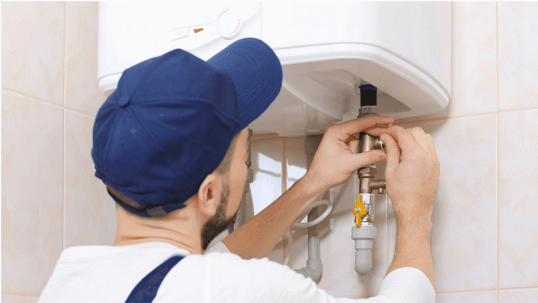Managing Common Water Heater Problems
Managing Common Water Heater Problems
Blog Article
In this article below you can locate additional good resources all about Common Problems with Your Home Water Heater.

Imagine beginning your day without your regular warm shower. That already sets an inadequate tone for the rest of your day.
Every residence requires a reputable hot water heater, but just a couple of know how to manage one. One very easy means to keep your hot water heater in leading shape is to check for faults consistently as well as repair them as quickly as they show up.
Keep in mind to turn off your water heater prior to sniffing about for faults. These are the hot water heater mistakes you are more than likely to run into.
Water as well hot or as well cool
Every water heater has a thermostat that establishes how hot the water obtains. If the water entering into your residence is as well warm regardless of setting a hassle-free maximum temperature level, your thermostat might be faulty.
On the other hand, as well cold water may be due to a stopped working thermostat, a busted circuit, or improper gas flow. As an example, if you utilize a gas hot water heater with a busted pilot light, you would certainly get cold water, even if the thermostat remains in excellent problem. For electrical heating units, a blown fuse may be the perpetrator.
Inadequate warm water
Water heaters can be found in several dimensions, depending upon your warm water needs. If you lack hot water before everybody has had a bath, your hot water heater is too tiny for your family size. You need to consider setting up a bigger hot water heater tank or going with a tankless hot water heater, which uses up less area as well as is extra sturdy.
Weird sounds
There go to least 5 type of sounds you can speak with a water heater, but the most common analysis is that it's time for the hot water heater to retire.
First of all, you need to recognize with the normal seems a water heater makes. An electric heating system might appear different from a gas-powered one.
Standing out or banging sounds normally mean there is a piece of sediment in your containers, and also it's time to clean it out. On the other hand, whistling or hissing audios may simply be your shutoffs allowing some pressure off.
Water leaks
Leakages can originate from pipelines, water links, shutoffs, or in the worst-case circumstance, the storage tank itself. With time, water will rust the storage tank, and discover its way out. If this occurs, you need to replace your water heater immediately.
However, prior to your modification your entire storage tank, make sure that all pipelines remain in place which each valve functions flawlessly. If you still need assistance recognizing a leakage, call your plumber.
Rust-colored water
Rust-colored water implies one of your hot water heater elements is worn away. It could be the anode rod, or the container itself. Your plumber will certainly be able to identify which it is.
Lukewarm water
No matter just how high you established the thermostat, you will not obtain any kind of warm water out of a heating unit well past its prime. A water heater's efficiency may minimize with time.
You will also get lukewarm water if your pipes have a cross link. This implies that when you switch on a tap, hot water from the heating unit streams in along with normal, cold water. A cross link is very easy to area. If your warm water taps still pursue shutting the hot water heater shutoffs, you have a cross link.
Discoloured Water
Corrosion is a significant cause of filthy or discoloured water. Rust within the water storage tank or a falling short anode pole might trigger this discolouration. The anode rod safeguards the storage tank from rusting on the within and must be inspected annual. Without a pole or a properly functioning anode rod, the hot water quickly corrodes inside the tank. Call a professional hot water heater specialist to establish if replacing the anode pole will fix the trouble; otherwise, change your hot water heater.
Conclusion
Preferably, your water heater can last one decade prior to you require a modification. Nevertheless, after the 10-year mark, you might experience any of these faults a lot more routinely. Now, you should add a new water heater to your budget plan.
How To Troubleshoot 3 Common Water Heater Problems in Twin Cities
The Water Heater Is Leaking
A leaky cold water inlet valve A loose pipe fitting A leaky temperature and pressure relief valve A corroded anode rod A cracked tank Turn Off Your Water Heater:
Shut off your gas water heater by turning the gas valve on the unit to the “OFF” position. Shut off your electric water by switching its power off at your electrical panel. Look for a two-pole breaker labeled “water heater” and turn it to the “OFF” position. Move the ball valve connected to the water heater to be perpendicular to the piping at a 90° angle. Look for the Leak:
Depending on whether the water is coming from the tank's top or bottom, you’ll want to look for the leak in different locations.
If the leak comes from the top of the tank, carefully look for water escaping from the cold water inlet valve or loose pipe fittings. Rusted hot and cold water valves can have loose connections with the tank, with water leaking out of them.
https://mspplumbingheatingair.com/blog/how-to-troubleshoot-3-common-water-heater-problems
I ran across that content on Water Heaters Problems while doing research the search engines. Are you aware of another individual who is looking into Water Heater Repair and Troubleshooting? Be sure share it. Thanks so much for your time invested reading it.
For true quality, dial! Report this page